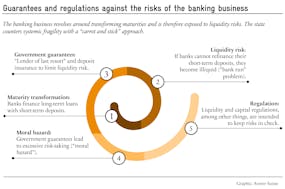Facebook’s announcement – along with nearly 30 companies, including Visa, Ebay, Uber, and Spotify – to launch a blockchain-based cryptocurrency has sparked a tremendous global response. Pascal Ihle interviewed the author of the Avenir-Suisse study “Blockchain after the hype” on this topic.
Pascal Ihle: Compared to other financial centers, Swiss banks has been continuously losing ground at home and abroad since the start of the financial crisis. Why?
Jennifer Anthamatten: There are different reasons for this development. On one hand, the Swiss banking industry faces increasing cost pressure. This is due to the rising regulatory and compliance cost, the interest rate environment and also partly due to the end of Swiss bank secrecy. On the other hand, digitization challenges the financial industry in general: new players enter the industry and try to disrupt the business models of established players.
In its study the think tank Avenir Suisse comes the conclusion that the Distributed Ledger Technology (DLT) has significant potential for the Swiss financial center. What makes you that optimistic?
In our study we make clear that DLT is not a universal remedy. But there are indeed specific areas in which DLT may substantially improve existing processes. Looking at the strengths and weaknesses of the Swiss financial center, we can observe an interesting pattern: On the one hand, DLT may help to strengthen Switzerland’s rather weak capital market. On the other hand, DLT can be used to further improve two of Switzerland’s key segments: trade finance by streamlining processes and reducing costs as well as asset/wealth management by exploiting new business opportunities. Therefore, DLT seems to perfectly complement the Swiss financial industry.
In which concrete fields could the Swiss financial system play a front-runner role?
We see three areas with significant potential for the Swiss financial system: trade with tokenized assets, trade finance as well as services related to asset/wealth management such as for example storage of private keys.
Most banks, notably UBS und Credit Suisse, are quite cautious about blockchain. Why should they suddenly embrace DLT?
Because with DLT they have the opportunity to exploit new business opportunities and to gain strength in the national and international competition. Looking at the past 10 years, this is more than necessary. It is not only an opportunity for the big banks, but also for smaller firms.
What is the advantage of DLT?
The specific advantage of DLT is the fact, that data integrity is achieved in a technical manner. This implies huge efficiency gains and cost savings. It enables the automation of processes such as, for example, time-consuming and expensive reconciliation.
Are the blockchain and fintech companies not challenging the traditional banking system?
Yes, they are, and this is good. Traditional players have to wake up and need to adjust to the new digital era if they want to be successful in the future. There are many business opportunities waiting to be captured. If your question addresses the discussion about the future role of intermediaries: There will not be a world without intermediaries. However, some of today’s functions of intermediaries disappear, while others emerge. To bridge the gap between real and virtual world, there will always be need for some kind of intermediary.
One important aspect is the regulation. How do you judge the actual situation?
We appreciate the approach pursued by the Swiss authorities so far. Creating legal certainty while pursuing a lean regulation is key. There is need for selective legal changes, but by no means should we aim for a DLT law as Liechtenstein did. The development in the DLT area is extremely fast-paced. Therefore, enacting a DLT law bears the risk to impede future developments of both DLT and other upcoming technologies. Having said this, time is of the essence. Switzerland should aim at implementing the identified legal changes as soon as possible to further strengthen legal certainty.
What should be changed to boost the blockchain innovation and entrepreneurship in the financial sector?
First of all, the current liberal regulatory approach should be continued. Further, private and governmental actors should both proactively move forward. The Swiss government lacks behind regarding developments in the digital space. It needs to ensure an adequate infrastructure and to eliminate existing obstacles for DLT development in areas, where private actors depend on governmental services or infrastructure. One example are the land registries. It is further important to find a good solution in order to integrate payment into trade with tokenized assets. Last but not least, a cross-border mindset is relevant: The access to skilled labor needs to be facilitated.
Which are the main competitors for Switzerland?
One of the most important competitors is Singapore. Singapore has clearly realized the potential of DLT, and it wants to exploit it accordingly. But there are other locations with a strong and developing DLT industry as well, such as the UK, the US or Hongkong.

Bitcoin, the most prominent example of DLT-based cryptocurrencies.(Dmitry Moraine, unsplash)
You stress the opportunities. What about the risks?
Related to opportunities we always face risk. It is important to approach the risk in a serious and proactive way. Nevertheless, the structural change in the financial industry is happening now and it will continue, no matter what traditional players do. Having this in mind, catching the opportunity is the best strategy one can have. The alternative is being squeezed out of the market.
Trust is the most important aspect for both, the traditional banks and DLT. How should clients be confident in DLT after crypto exchanges having been hacked and investors having lost their private keys (custody) or their funds?
This is exactly the reason why intermediaries will continue to exist. DLT is able to provide a safe transaction of value and information. However, safety before and after such a transaction is as important as during the transaction. There will always be a need for interfaces between real and virtual world. This is where intermediaries will play an important role in the future.
Last question: Time is money. How much time does the Swiss financial system has, to embrace the opportunities of DLT — and not to lose more ground?
They should better start today instead of tomorrow. It is not only about losing ground, but it is also about playing the role of the first mover and, thus, exploiting business opportunities as well as gaining market share.
The article was first published in German on the website “Influence” by Furrerhugi, in English in the blog of CV VC (Crypto Valley Venture Capital).





